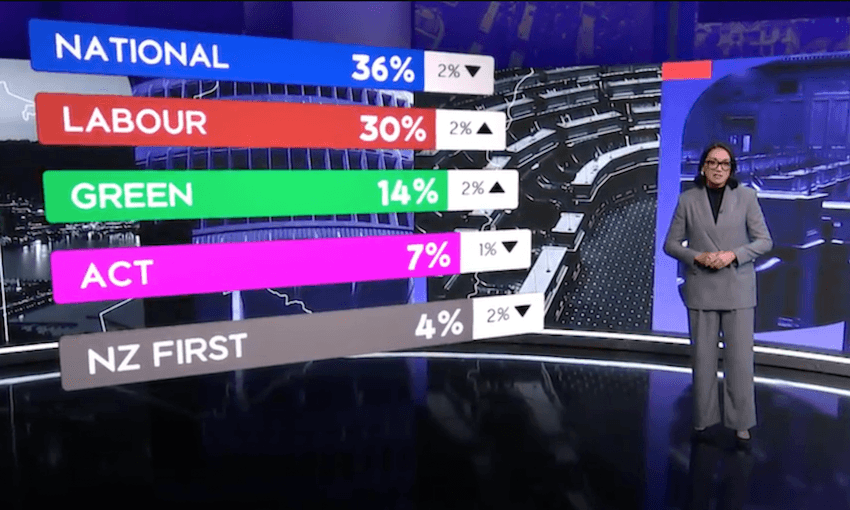The outpouring of anger over Maiki Sherman’s hyperbolic presentation of this week’s ‘nightmare’ poll is itself an overreaction, argues Stewart Sowman-Lund.
Politicians love nothing more than to pretend they don’t care about polls. This week, deputy prime minister Winston Peters said he didn’t give a “rat’s derriere” about a TVNZ Verian poll that showed his party slumping below the 5% threshold. David Seymour said his party dropping a point wasn’t a big deal because it was “high compared to its historic support”. And prime minister Christopher Luxon said he’s “not that fixated” on the numbers because he’s so focused on leading the country. “I don’t spend a lot of time thinking about polls,” he added.
These types of responses are nothing new. Before last year’s election, Luxon said polls were “hypothetical” and his focus was on election day. Labour’s Chris Hipkins isn’t immune, either. Last year, he said he was “not at all” worried about his languishing performance in the preferred prime minister stakes. “I’m not going to get obsessed about those, I’m focused on winning votes.”
All of these are valid points of view and it’s totally fine for the political leaders of our country to say it to the cameras, even if behind closed doors they (and especially their advisors) probably don’t believe it.
But if politicians are so defiant in their ambivalence towards polls, should they not be just as nonchalant about the way they’re delivered to the public?
On Monday night’s TV bulletin, 1News political editor Maiki Sherman injected some flair and excitement into what would otherwise have been just a series of different numbers. “Political turbulence ahead – buckle up, brace for impact,” she said, before going on to describe the poll as a “nightmare” for the government that could “absolutely rock the entire parliament”. For 1News viewers, this style of delivery appears to have come as a bit of shock. The Herald reported that the state broadcaster was facing about 50 formal complaints, despite Sherman’s accurate explanation of why the numbers were interesting (a Labour-led government was more popular than the current coalition after just five months in office).
To put this in perspective, TVNZ received 2,232 formal complaints across all of 2023. Anyone would think Sherman must have made the numbers up to warrant such a hostile response.
It irked others, too, like Newstalk ZB host Mike Hosking, who questioned whether it was acceptable for the political editor of 1News to dare use hyperbole. Later in the day, former Labour MP Stuart Nash also appeared on Newstalk ZB and called the poll delivery “absolutely shocking”.
He added: “You can report on this. Just don’t get all melodramatic.”
Prime minister Christopher Luxon called it “frothy and sensationalist”, before admitting he hadn’t actually watched the bulletin because he’s too focused on “fixing New Zealand”.
There’s some irony here considering politicians love nothing more than to be “melodramatic” or “sensationalist” because it gets them attention. Why else would TVNZ make a big fuss out of a poll five months after an election if not to also get some attention at a time when eyeballs are turning away from TV news.
But beyond that – what’s wrong with making polls fun? Newshub has been doing it for years with little to no backlash from the public or parliament. In 2020, former Newshub political editor Tova O’Brien said her latest poll would launch “a bazooka into the election campaign”. Patrick Gower would routinely work himself into a frenzy over the numbers, and before him Duncan Garner. In the lead up to last year’s election, Jenna Lynch did the same. This poll will “send a shiver up the spine of one party”, Lynch said in November 2022. “This poll is a tectonic shift in the political centre of gravity,” she said a few months later. In all of these polls, the numbers were sitting right there on the screen – Lynch and her predecessors just chose to spice them up a bit with their delivery.
Granted, polls hold extra weight in an election year, but even so, perhaps a bit of flair in non-election years will help keep voters engaged beyond the six weeks of campaigning every three years. TVNZ has traditionally, to be frank, been quite dull in its presentation of polls. This was Sherman’s first poll since becoming political editor, and I for one welcome the shift in energy we saw from her.
Tonight on @NewshubNZ at 6pm.. a poll which launches a bazooka into the election campaign @NewshubPolitics pic.twitter.com/JsVXm1LNYi
— Tova O'Brien (@TovaOBrien) July 26, 2020
Not to mention that with Newshub’s impending demise, we’re likely to lose this more dramatic style of poll theatre – especially if TVNZ caves after the reaction we’ve seen this week. And that’d be a shame. Polls are inarguably important, even if politicians claim otherwise. They’re a marker of the public mood and a signal to political parties that some things work, and others don’t.
But as the cliche goes, the only poll that really matters is election day. And in that sense, there’s nothing saying television polls can’t, or shouldn’t, be exciting every other day. A poll two-and-a-half years out from an election isn’t going to change the game, so what’s stopping a political editor choosing to hype it up?
If politicians are going to consistently say they don’t care about the numbers, they should be even less fussed about how a broadcaster chooses to present them. Luxon – and others – should practice what they preach: focus on doing their jobs. And let the journalists do theirs.





